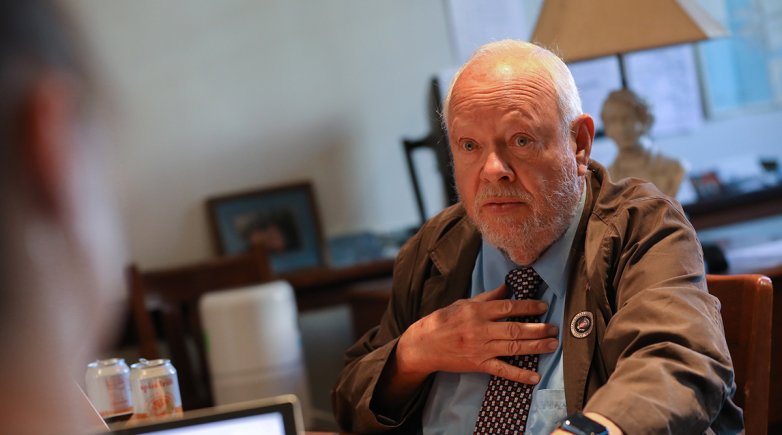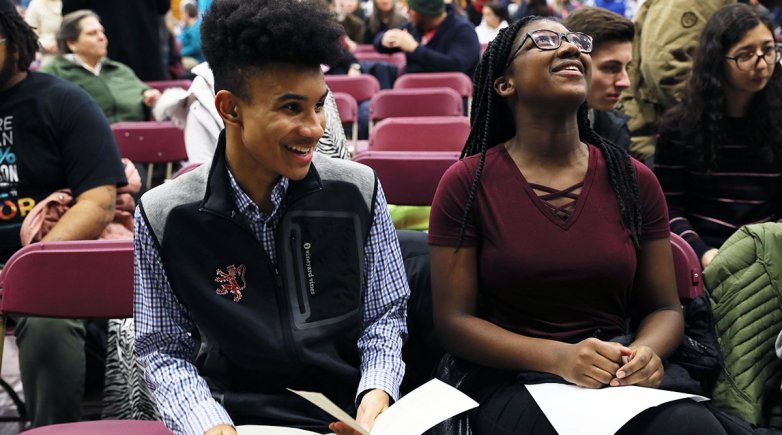In early May, the U.S. Supreme Court landed squarely in the national spotlight with the unprecedented leak of a draft opinion that would revoke the abortion rights guaranteed in 1973’s Roe v. Wade. Barely a week later, Exeter’s Department of History hosted a visit by the award-winning historian Orville Vernon Burton, co-author of a new book on the Court’s three-century-long history on race.
A native of South Carolina who has held named professorships at Clemson University and the University of Illinois, Burton has written numerous books on American history and has served as an expert witness for minority plaintiffs in voting rights and discrimination cases across the United States.
During his visit to the Academy, Burton gave a lunchtime seminar on “Taking History to Court” in the Latin Study and an evening talk at the Class of 1945 Library, during which he discussed Justice Deferred: Race and the Supreme Court, which he wrote with the civil rights lawyer Armand Derfner. He visited two sections of History 553: Law and American Society, taught by History Instructor Kent McConnell, a longtime mentee and friend.
Finally, Burton sat down for a conversation with Lauren Jebraili ’23, an upper in the Law and American Society class. Jebraili, who grew up in the Washington, D.C. area, plans to major in history. She spoke with Burton about the cases that inspired him to write Justice Deferred, along with issues of freedom of speech and religion, balancing the power of federal and state government, and today’s Supreme Court, among other topics.
Here are some edited excerpts from their conversation:
What made you focus on writing about the law and history [in Justice Deferred]?
We really thought this was a time that people needed to understand how the Supreme Court works. And we use this book not as a case book, not as a legal book, but as a history of race in America as seen through the eyes of the Supreme Court, using the Supreme Court as a lens to understand the history of race and race relations in America.
We talked in class about the Barnette v. West Virginia case [in which a school tried to expel students for refusing to say the Pledge of Allegiance]. What do you think about the line between freedom of speech and freedom of religion — and how far do we actually have those freedoms under the law?
On that case, it's very clear [that the students] were following their religious tenets, and that should be a freedom of [religious] expression. It gets more tricky with other things, like hate speech or encouraging violence and things like that. This is a tough issue, and will continue to be, and the court changes over time on this issue. I see it and worry about what's going on in, in fact, our universities about who can speak and who cannot speak.
When you were writing Justice Deferred, were there any cases specifically that you wanted to ensure were there?
We looked at thousands of cases and discussed those that were most relevant to how the law has been interpreted and changed over time. In the first case dealing with African Americans, the federal government was sued by John Quincy Adams, the former president, in the Amistad case [United States v. The Amistad, 1841]. The Court found for the Africans, and then it begins to go the other way. I learned so much from looking at the dissents. We used to so often excuse people for their times — "Oh, well, that was earlier and people didn't know" — but the dissents often showed that other people knew, at the same time, what was right.
The [Court’s] defining of race itself I find very fascinating. The Naturalization Act of 1790 limited naturalization to free white persons. In 1870, you have a change because of the 14th Amendment, which says that African Americans can be naturalized. In 1922, a Mr. Ozawa believed that they had changed the law enough that it no longer applied to people…like himself, who had been born in Japan [but came to the United States as a child]. The Supreme Court hemmed and hawed and finally they said that what [the law] actually meant was that you had to be Caucasian. The next year, a Mr. Thind, whose ancestry actually went back to the Caucasian Mountains — a real Caucasian — applied for citizenship. The Court tried to provide some rationale for its decision [to deny him] and finally decided that “Caucasian” really meant “white.”
The case that really speaks to me because this is what I grew up with [is 1967’s Loving v. Virginia], which said Black and white and people of other races could marry…The Supreme Court has dealt with all these issues, and really, so do we in this book. That's not the most important case, but I think it catches the confusion of — what is race? There is no such thing. The Court has struggled time and time again to define race.
That’s really interesting. That would be the crucial part, because when you want to have discussions about race in the first place, you're working on the assumption that race is an actual thing, but it's really just a concept.
That’s right. It’s a social construct that we have put together. And yet, it means something legally, or has. We've tried to move away from that, I think, with the 14th Amendment. The 13th, 14th, and 15th Amendment are part of the Constitution, and I think if Supreme Court justices read those…as broadly as they read [the First, Second, and Third Amendments], it seems to me there's no problem, although they've been ruling the other way in the last few years.
I wanted to ask about Roe v. Wade, and whether that case is less about abortion rights and more about — does the state have the right to determine the abortion [question] or does the federal government have that right? What are your thoughts on that?
I truly believe that the 13th, 14th and 15th Amendments, which Abraham Lincoln is responsible for — they all are done in his name and his legacy — changed the Constitution. Before that, everything was relegated to the states. But the 13th, 14th and 15th Amendments give Congress the right to pass these laws that expand individual liberty to protect them in those states where they are not protected. Lincoln took what we think of as positive liberty — and also what I call our mission statement, the Declaration of Independence — and put it into our rule book, the Constitution, so that these rights are guaranteed.
As a teacher, what is the main thing you want to teach students about the law and how the law should be working?
What I’m concerned about is that I think democracy is in a crisis that it has not been since 1860. The very things that Lincoln faced in 1860, we’re facing today…When you ask me the most important cases, it’s these cases that are trying to keep people from being able to vote. That's the opposite of what a democracy is. I want [students] to see that people have been able to make positive changes, that groups of people like Martin Luther King, and many, many before him, came together to get unjust laws changed. This is something that Lincoln understood, I believe. It's important that we can do something, and the basis of that is the vote.



